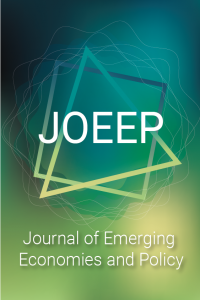Ekonomik Büyümenin Güney Afrika'da Çevresel Bozulma ve Enerji Tüketimine Etkisi: Bir Eşbütünleşme Analizi
CO2 Emisyonları, Çevresel Deregülasyon, Güney Afrika
Impact of Economic Growth on Environmental Degradation and Energy Consumption in South Africa: A Cointegration Analysis
CO2 Emissions , Environmental Deregulation, South Africa,
___
- AbdulKareem, H. K., Adebayo, T. S., Kirikkaleli, D., Shah, M. I., & Abbas, S. (2022). CO2 behavior amidst the COVID-19 pandemic in the United Kingdom: The role of renewable and non-renewable energy development. Renewable Energy, 124 (10), 67-75
- Adebayo, T. S. (2020). Revisiting the EKC hypothesis in an emerging market: an application of ARDL-based bounds and wavelet coherence approaches. SN Applied Sciences, 2(12), 1-15.
- Adebayo, T. S., & Beton Kalmaz, D. (2020). Ongoing debate between foreign aid and economic growth in Nigeria: a wavelet analysis. Social Science Quarterly, 101(5), 2032-2051.
- Yayın Aralığı: Yılda 2 Sayı
- Başlangıç: 2016
- Yayıncı: Seyfettin ERDOĞAN
Türkiye'de Tüketim Modelinin Deşifre Edilmesi: Bir Euler Denkleminin İncelenmesi
Türkiye'nin Mali Tepki Fonksiyonunun Tahmin Edilmesi: Sıralı Probit Yaklaşımı
Metin TETİK, Reşat CEYLAN, Görkem KARA
Küresel Finansal Krizi Yeniden Düşünmek: Heterodoks İktisat'tan Teorik Perspektifler
Fazıl KAYIKÇI, Mustafa KESGİN, Sema YILMAZ GENÇ
İlker BAYRAM, Selma GÖKTÜRK ÇETİNKAYA
Makro Ekonomik Göstergelerin Dış Ticaret Dengesi Üzerine Etkisi
Nazmi BAĞDINLI, İsmet Kahraman ARSLAN
Öğrenilmiş Güçlük ile Güçlendirmenin İş Stresi Üzerine Etkisi: Kamu Sektöründe Bir Araştırma
Deniz PALALAR ALKAN, Bilal ÇANKIR
Abraham Ayobamiji AWOSUSİ, Olushola Victoria OLANREWAJU, Opeoluwa OJEKEMİ, Kaan KUTLAY, Dervis KİRİKKALELİ, Haktan SEVİNÇ
